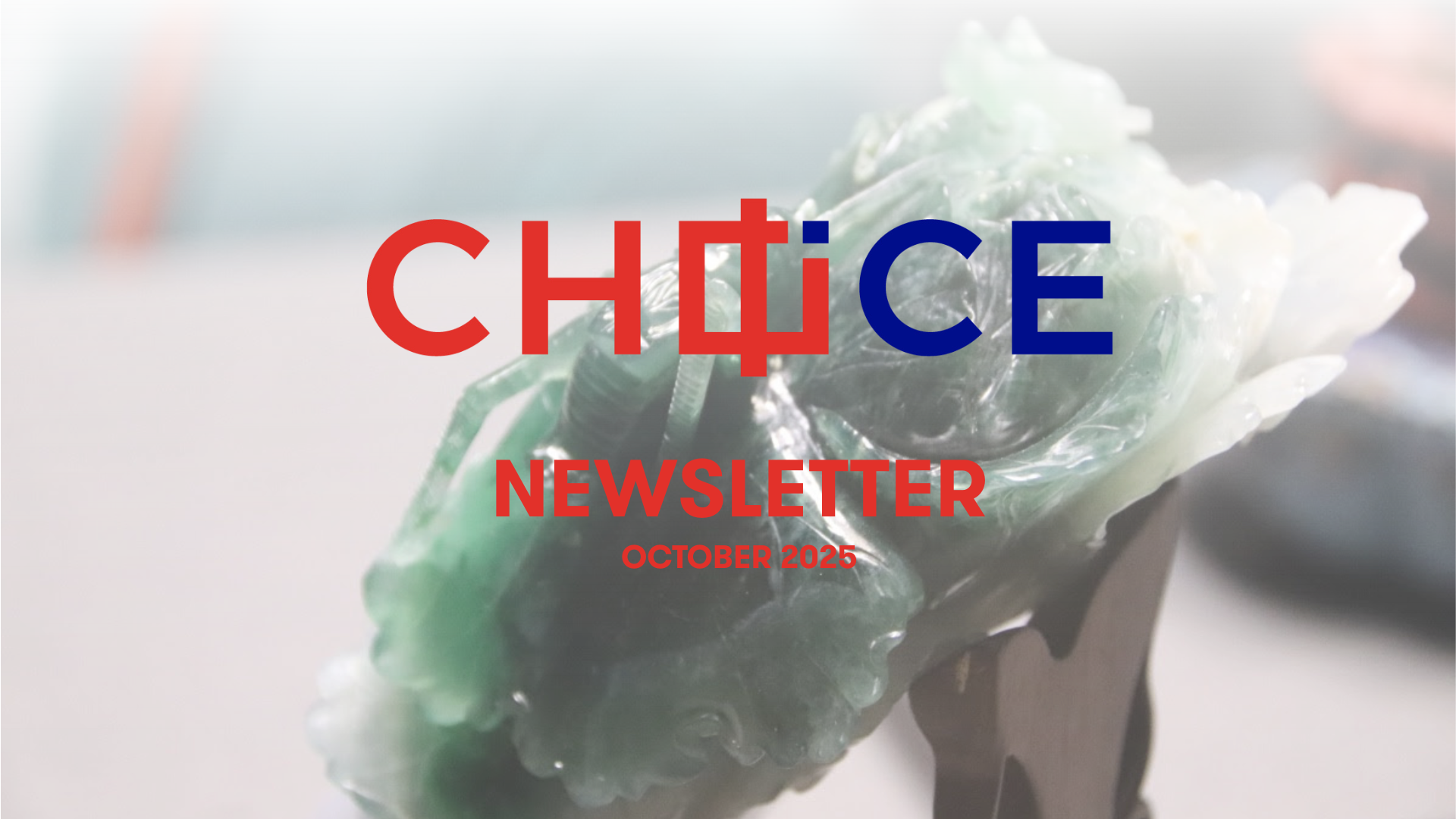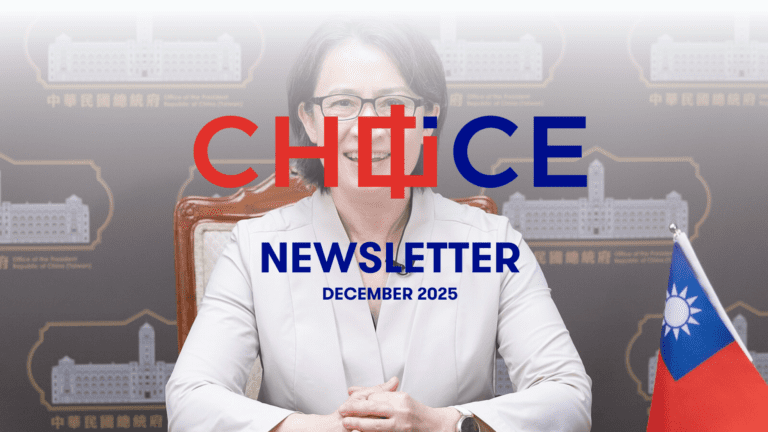CHOICE Newsletter: Wang Yi Visits Central Europe Amid Russian Drone Provocations

Dear reader,
October finalizes a change of guard at CHOICE. We’re bidding farewell to our Senior China Analyst Filip Noubel, who is moving on to develop his own projects. We thank Filip for his sharp analysis of Chinese domestic affairs, numerous Taiwan columns he authored and a language corner at our Czech Instagram account, and wish him every success.
We’re also happy to go public with two colleagues who have been working with us over the past month – our very own Brussels duo. Emma Belmonte (École Normale Supérieure de Lyon, BA Philosophy; University of Oxford, MPhil Modern Chinese Studies) – journalist, sinologist, and podcaster – focuses on China’s foreign policy. Born in Brussels, Emma knows more about the city’s beers and hidden corners (and talks about the city as a “she”) than just about anyone. Konrad Szatters (College of Europe; Research Assistant at the Public Diplomacy and Political Communication Forum, University of Canterbury, New Zealand) works on China’s discursive power, propaganda and disinformation, and on Russia–China relations and their implications for Ukraine. A proud Silesian and the person who knows a lot about China–Poland relations (don’t hesitate to ask him) Konrad pairs regional savvy with sharp analysis. Emma and Konrad are strengthening our advocacy presence in Brussels; if you’re in town, say hi to them!
In this CHOICE Take, Konrad looks at Wang Yi’s visit to Poland. Our Taiwan column turns to Prague’s hosting of the artefacts from the National Palace Museum exhibition – the main star being the “cabbage”– and asks whether this style of cultural diplomacy reflects how the island wants to present itself in the 21st century. (Perhaps someone should have told the Czech National Museum – but it insisted this was exactly the item from the collection it wanted.)
But before we dive in: Czech voters head to the polls this Friday and Saturday, October 3-4. The outcome could carry important implications for the country’s China policy. If you’d like to follow what’s at stake, we recommend our colleague Paulína Ovečková’s analysis.
With that, over to Konrad, Taiwan, and a packed slate of recommended reads and events.
By Ivana Karásková, CHOICE Founder and Lead
CHOICE Take
Wang Yi Visits Central Europe Amid Russian Drone Provocations
Chinese foreign minister Wang Yi’s visit to Poland on September 15 took place amid the backdrop of rising security tensions on NATO’s eastern flank. Just days before his arrival, nineteen Russian drones entered Polish airspace, and a few days later another one strayed into Romania. In the case of Poland, authorities clearly stated that this was not a matter of drones accidentally crossing the border but a deliberate provocation. During the incursion, the highest levels of command in Warsaw assumed the worst-case scenario: that Vladimir Putin had decided to launch a direct attack on Poland, prompting an immediate reaction and the decision to shoot down the drones. These incidents underscore the vulnerability of Central and Eastern Europe (CEE) to the spillover effects of Russia’s war and may further change the perspective on China’s engagement in the region.
Beijing’s decision to send Wang Yi to Central Europe is therefore significant. Traditionally, Chinese high-level diplomacy in Europe has focused on Berlin, Paris, and Brussels, while outreach to CEE countries was based more on the assumption that they would simply accept whatever they were offered. However, a lot has changed in the last couple of years. The region has begun to show greater resilience and autonomy, including toward China. As a result, the once-flagship ‘16+1’ framework has lost its momentum, and other Chinese activities – such as Confucius Institutes and the BRI – are increasingly viewed with skepticism.
Despite this, Central Europe remains important to Beijing, and among the CEE countries, Poland stands out as both the largest economy and a key node in the rail connections between China and Europe. The Małaszewicze hub, where broad-gauge tracks from Belarus meet the EU-standard ones, has long served as the main gateway for Chinese freight trains, although the closure of the Polish-Belarusian border during the Russian-Belarusian Zapad-2025 military exercises has exposed the vulnerabilities of this corridor. For Beijing, whose priority is to ensure stable trade flows under the BRI, Poland’s geography represents both an opportunity and a challenge.
The Russian drone incursions add another layer of complexity. Though they were not treated as an escalatory act by NATO, they nevertheless demonstrate that the Alliance members’ defense capabilities are being directly tested by Russia’s semi-military operations. For Central Europe, this reinforces the perception that the war in Ukraine cannot be neatly contained and that physical security risks may spill across the region – or even further west into the EU. In this context, China’s voice carries weight, yet its position, as reiterated during Wang Yi’s meeting with the Polish foreign minister Radosław Sikorski, has not changed. Chinese officials consistently call for dialogue and restraint, urging the parties involved to resolve incidents peacefully and by means of dialogue. At the same time, Beijing avoids assigning direct responsibility to Russia, reflecting its broader narrative that frames Moscow as a strategic partner pushed into confrontation with the West.
For Central Europe, this reveals the limits of what China can – or is willing to – offer. Regional governments cannot expect Beijing to mediate with Moscow or to play a constructive role in deterring further incidents, not to mention supporting Ukraine’s defense. Instead, China’s focus is likely to remain on preserving connectivity for its exports and maintaining workable economic relations with its CEE partners. Wang Yi’s visit to Poland demonstrated this dual logic. On the one hand, Beijing values Poland as an important market and a transit hub, and recognizes Poland’s economic rise by supporting its planned bid to join the G20. On the other, it acknowledges that CEE states are (more or less) embedded within NATO and the EU – organizations with which China’s relations are increasingly competitive.
The divergence in perspectives is evident. For Warsaw and other CEE capitals, drones crossing NATO and EU borders are security threats that demand immediate deterrence and Alliance cohesion. For Beijing, they are secondary to its rivalry with the US, which remains the top priority, and to maintaining stability in trade and (geo)political alignment with Moscow. The result is a persistent gap between Central Europe’s security priorities and China’s diplomatic posture.
The implications are clear. Central Europe cannot expect China to contribute meaningfully to its security or to act as a truly neutral broker in Russia’s war in Ukraine. Nonetheless, Wang Yi’s visit serves as a reminder that China remains attentive to the region’s role in global supply chains and geopolitical competition, even as it leans strongly toward Moscow. For Poland and other like-minded CEE states, the challenge is to sustain pragmatic cooperation with China while recognizing that reassurance and security guarantees – if they come at all – will come only from NATO (including the US) and from EU member states, not from Beijing.
By Konrad Szatters, CHOICE Analyst (based in Brussels)
Taiwan in Focus
The display of Taiwan’s National Palace Museum’s iconic piece of jade known as the ‘Cabbage with Insects’ in the Czech National Museum in Prague on September 11 marks the highlight of Taipei’s diplomatic campaign, labeled “Taiwan Culture in Europe 2025”. Its aim is to boost the visibility of the island, and counter Beijing’s narrative that denies the right of existence to the 23 million people nation. But is this kind of cultural diplomacy enough to shape perceptions?
South Korea’s highly successful story of ‘Hallyu’ (한류) – the Korean Wave that rebranded the country into a cultural powerhouse is given as an example of how Seoul succeeded globally where Beijing and Taipei are still learning the ropes. Undoubtedly, China can now claim a few success stories around the online game Black Myth: Wukong, the animation movie Nezha, or even the toy Labubu.
For Taiwan, playing the cultural card presents a double challenge: its strong Chinese cultural heritage means it is perceived overseas as little different from China; meanwhile its indigenous culture and complicated colonial past remain little known. What card should it play then? The answer might lie in what Switzerland and Nordic countries relied on for a long time to build their image: branding democracy as a distinguishing marker of identity. Taiwan here has several assets: its own transition to democracy, LGBTQI+ rights, its open questioning of identity across ethnic and language lines. At a time of sweeping GenZ movements across Asia and Europe, this might be more appealing than relying on old relics, no matter how beautiful they shine in museum glassboxes.
By Filip Noubel, CHOICE Analyst (based in Taipei)
WiCH Highlights
🇵🇱 🇨🇿 Alicja Bachulska, Co-Chair for Poland, and Ivana Karásková, our Lead and Co-Chair for Czechia, wrote a paper on the China-Russia nexus and European security. Read it here! We organized a workshop based on the paper. Learn about it here!
🇬🇧 Meia Nouwens, our Co-Chair for the UK, spoke at the IISS Prague Defense Summit and recorded a podcast reflecting on the event. Tune in here!
🇮🇹 Francesca Ghiretti, our Co-Chair for Italy, wrote a paper on China’s economic deterrence playbook. Read it here!
CHOICE News
 We have a new paper! CHOICE investigated how Parliamentary Assistants’ networks and hiring practices create systemic blind spots that expose the European Parliament to Chinese influence (read it here).
We have a new paper! CHOICE investigated how Parliamentary Assistants’ networks and hiring practices create systemic blind spots that expose the European Parliament to Chinese influence (read it here).
 Konrad Szatters was interviewed by the Polish outlet Onet on matters of China’s plan for Europe (check it out here). The interview was cited in Spanish as well (read it here).
Konrad Szatters was interviewed by the Polish outlet Onet on matters of China’s plan for Europe (check it out here). The interview was cited in Spanish as well (read it here).
 Paulína Ovečková wrote an article about China’s export trends and Labubu for Wired.cz (read it here) and commented for iROZHLAS on Xi Jinping’s military parade in Beijing (check it out here).
Paulína Ovečková wrote an article about China’s export trends and Labubu for Wired.cz (read it here) and commented for iROZHLAS on Xi Jinping’s military parade in Beijing (check it out here).
 Dominika Remžová published the Slovak version of her paper on Chinese investments into EVs in Slovakia (read it here), which was mentioned by Denník N and The Slovak Spectator (read it here and here).
Dominika Remžová published the Slovak version of her paper on Chinese investments into EVs in Slovakia (read it here), which was mentioned by Denník N and The Slovak Spectator (read it here and here).
 We’re on Bluesky, LinkedIn, X, and Instagram! Stay updated with our latest articles, insights, and news by following our accounts – don’t miss out on valuable content and updates.
We’re on Bluesky, LinkedIn, X, and Instagram! Stay updated with our latest articles, insights, and news by following our accounts – don’t miss out on valuable content and updates.
This is the web version of our newsletter. If you’d like to receive the CHOICE newsletter in advance, straight to your inbox, sign up here:
Written by
CHOICE
CHOICE is a multinational consortium of experts providing informed analysis on the rising influence of the People’s Republic of China within the countries of Central and Eastern Europe (CEE).


